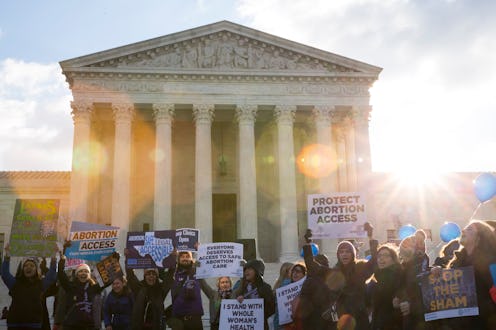News
The Worst-Case Scenario In SCOTUS' Abortion Case
The Supreme Court will begin hearing arguments Wednesday in the highly-anticipated abortion case Whole Women's Health v. Hellerstedt, a challenge to the Texas state legislature bill HB-2, which places various restrictions on abortion access and has caused many clinics across the state to close. The fate of the ruling ultimately rests on the verdict from the Planned Parenthood v. Casey trial in 1992, which stated that no undue burden can be placed on a woman seeking an abortion. That ambiguous declaration now requires the Supreme Court to step in and elucidate just what constitutes an "undue burden" for a woman seeking abortion care. Depending on how the court decides, it could be very bad for either pro-choicers or pro-lifers.
When introduced, HB-2 was described as a measure to keep women safe and protect their health, which is why it might not be considered an undue burden. If the bill is upheld, it opens the door for all kinds of abortion restrictions that would essentially make access to care impossible. States are all too happy to regulate abortion — between 2011 and 2013, state legislatures approved over 200 new abortion restrictions, more than during the entire previous decade.
Five states are already down to only one abortion provider, and because they tend to be socially conservative and staunchly anti-abortion, even those might soon disappear. The worst-case scenario for pro-choicers is that the bill is upheld and any abortion restrictions masquerading as health and safety concerns can be passed through more legislative bodies without a second thought.
For the anti-abortion supporters, the worst-case scenario is slightly less devastating. Yes, the bill would be overturned, but a lot of the damage has already been done — most if not all of the dozens of abortion clinics across Texas which closed due to HB-2 would likely stay closed. A more serious consequence of SCOTUS' potential ruling would be a new interpretation or clarification of the vague standard set by Planned Parenthood v. Casey trial. Striking down the bill could make way for arguments against many other abortion restrictions, like forced vaginal ultrasounds and mandatory waiting periods.
However, Supreme Court Justice Antonin Scalia's recent death throws a wrench in these scenarios. Scalia, an unbending conservative and consistent anti-abortion proponent, would have almost certainly voted to uphold HB-2, which more than likely would have brought the vote to a definitive five-to-four margin. However, with only eight justices on the bench and every indication that Republicans won't allow a new justice to be nominated until there's a new president, the case can be argued before the court again in the event of a split ruling. So it's possible that neither of these worst-case scenarios will come to pass — at least, not until there's a new Justice.
